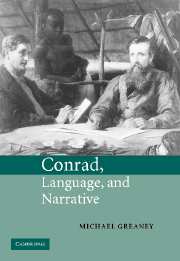Introduction
Published online by Cambridge University Press: 22 September 2009
Summary
In 1907, when he already had some of the greatest novels in English to his name, Joseph Conrad confessed to Marguerite Poradowska that ‘l'Anglais m'est toujours une langue etrangère’. Like so many of the major modernist authors whose work has been assimilated into the canon of English literature, Conrad was an ‘outsider’, a foreigner on whom posterity has conferred the status of honorary Englishman, but who probably belongs with that later group of twentieth-century writers described by George Steiner as ‘extraterritorials’. Born in the Czarist-ruled Polish Ukraine in 1857, Conrad joined the French navy in 1874 before obtaining a berth on a British vessel in 1878. Seventeen years later he published his first novel, Almayer's Folly, the beginning of a career that produced some of the most venturesome fiction in the literature of what was his third language. The transformation of Józef Teodor Konrad Korzeniowski into Joseph Conrad was a prodigious feat of literary self-fashioning; but Conrad took profound exception to being paraded in the literary journalism of his day as ‘a sort of freak, an amazing bloody foreigner writing in English’. It is very easy – and rather misleading – to assume that the English language was an obstacle between Conrad and creative expression; one could argue with equal justification that Conrad's sense of estrangement from his adoptive tongue was the very enabling condition of his fiction. We would do well to consider the possibility that Conrad wrote his masterpieces because rather than in spite of the English language.
- Type
- Chapter
- Information
- Conrad, Language, and Narrative , pp. 1 - 8Publisher: Cambridge University PressPrint publication year: 2001



